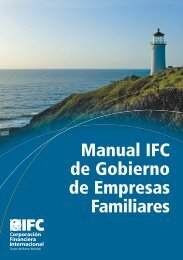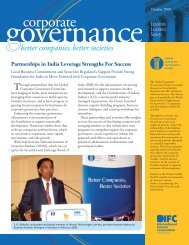Corporate Governance for Banks in Southeast Europe: Policy - IFC
Corporate Governance for Banks in Southeast Europe: Policy - IFC
Corporate Governance for Banks in Southeast Europe: Policy - IFC
You also want an ePaper? Increase the reach of your titles
YUMPU automatically turns print PDFs into web optimized ePapers that Google loves.
depend on the presence of active <strong>in</strong>stitutional <strong>in</strong>vestors. Differences <strong>in</strong> levels of acceptance and perceivedutility may also relate to whether the country comes from a common law or civil law tradition.The SEE countries thus face a sort of regulatory conundrum: the commonly used developed-market approachof rely<strong>in</strong>g on the board and voluntary codes as a nuanced, soft, outsourced <strong>for</strong>m of regulation may notsuit the local culture; on the other hand, the imposition of hard rules has been criticized as a superficialcompliance exercise that adds little value to the bank.A possible <strong>in</strong>termediate approach <strong>for</strong> better embedd<strong>in</strong>g good governance <strong>in</strong> banks might be to set up task<strong>for</strong>ces, with prom<strong>in</strong>ent bankers and bus<strong>in</strong>ess people, that develop best practices that would <strong>in</strong> turn becomeobligatory <strong>for</strong> all banks. This approach of us<strong>in</strong>g private sector <strong>in</strong>put <strong>for</strong> the development of governancepractices, which then becomes mandatory, is not uncommon <strong>in</strong> countries with more normative regulatorycultures.The <strong>in</strong>stitutional aspects of voluntary codes also need to be considered. Voluntary codes tend to be en<strong>for</strong>cedby securities regulators or stock exchanges and ultimately the markets. Given the relative size of securitiesmarkets <strong>in</strong> SEE, guidance on corporate governance would likely need to emanate from central banks.Voluntary codes <strong>in</strong> other countries have been developed by private groups and then published as central bankcirculars.Recommendation:Guidance on corporate governance: Regulators should provide guidance on sound governance practices.Such guidance must be adapted to the local environment and go beyond the mere transposition of<strong>in</strong>ternational rules and codes. 77 The implementation of the guidance must also be <strong>in</strong> accord with the localbus<strong>in</strong>ess and legal culture. Voluntary corporate governance codes should be developed with the participationof the private sector; however, the correct balance between hard and soft law needs to be found. SEEcountries may require more <strong>for</strong>mal means of implement<strong>in</strong>g codes than other countries require.B. Monitor<strong>in</strong>g 78Supervisors need to have processes <strong>for</strong> evaluat<strong>in</strong>g the quality of bank governance and the implementation oflegal requirements. Regulators are <strong>in</strong>creas<strong>in</strong>gly expected to take corporate governance <strong>in</strong>to account as part oftheir risk assessment <strong>for</strong> banks. This monitor<strong>in</strong>g can take different <strong>for</strong>ms, such as the follow<strong>in</strong>g: the collectionof <strong>in</strong>ternal and prudential reports, <strong>in</strong>clud<strong>in</strong>g statements of external auditors; the use of <strong>for</strong>mal evaluations orscorecards; and onsite <strong>in</strong>spections. Such monitor<strong>in</strong>g should focus on the bank’s risk profile and those aspectsof governance that have an impact on the bank’s overall safety and soundness.This approach implies look<strong>in</strong>g closely at the bank’s control environment and risk management functions aswell as the capacity of the board to monitor the effectiveness of such systems. Further items that can beexam<strong>in</strong>ed at board level are fit-and-proper tests, and whether the board has the necessary comb<strong>in</strong>ationof skills to ensure safe and sound operations. Bank evaluations can <strong>in</strong>volve regular meet<strong>in</strong>gs with boards,executives, and people responsible <strong>for</strong> key aspects of the control environment.With<strong>in</strong> SEE, supervisors conduct full-scope exam<strong>in</strong>ations of banks and may develop recommendations <strong>for</strong>executives and boards. Such exam<strong>in</strong>ations can cover any number of issues. However, the extent to which77 Nevertheless, the guidance of <strong>in</strong>ternational bodies should not be ignored. In particular, the 2006 and 2010 BIS Pr<strong>in</strong>ciples (see Annexes C and D)should receive broad consideration.78 2010 BIS Pr<strong>in</strong>ciples, Sections IV.2 and IV.3. pp. 31–32.52<strong>Policy</strong> Brief<strong>Corporate</strong> <strong>Governance</strong> <strong>for</strong> <strong>Banks</strong> <strong>in</strong> <strong>Southeast</strong> <strong>Europe</strong>



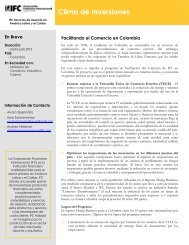
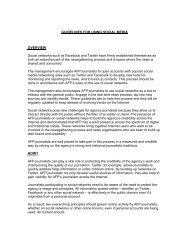
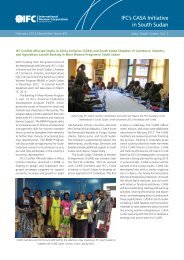
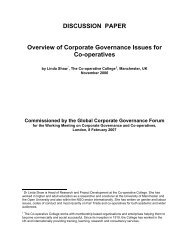
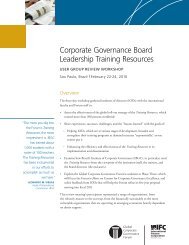

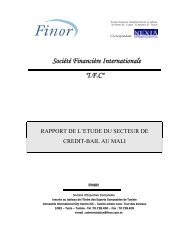


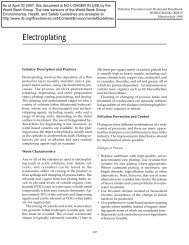
![Print a two-page fact sheet on this project [PDF] - IFC](https://img.yumpu.com/43449799/1/190x245/print-a-two-page-fact-sheet-on-this-project-pdf-ifc.jpg?quality=85)
